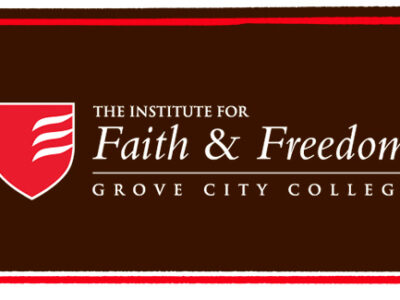Good afternoon, thank you for joining us here today for our annual celebration of, “Wow, we survived another year!”
In all seriousness, congratulations to all of you for another excellent year in the precious story we call the history of Grove City College.
I am uncertain when this tradition of a closing meal between board members, faculty and administration began, but it has been ongoing as long as I can remember at the College, and I have to admit, the older I get, the harder it is to remember.
As some of you know, I have been a member of the Session at First Presbyterian Church in Charlottesville, Virginia for the last three years, and we had a retreat this past January. During the start of that retreat our interim pastor asked us to go around the circle and talk about what was on our minds these days. One of the senior members of the group said, “I spend a lot of time these days thinking about the hereafter.” Several people murmured their assent and then Jim said, without missing a beat, “You know what I mean, I walk into a room, look around aimlessly and say to myself, what am in here after?”
Each year as I begin to think about what would make an appropriate topic for discussion for us, I am reminded of the days when consulted on these addresses by the man that was Chairman while I was a student here, and my subsequent employer, Albert A. Hopeman, Jr.
David Lascell and I would be consulted, both about what folks might like, or perhaps it would be more accurate to describe it from Mr. Hopeman’s vantage point, what they needed to hear about. We would give our opinions independently; Mr. Hopeman rarely if ever accepted our topics. He would write the speech out in long hand, have it typed, ask our comments on content, which we gave earnestly—he ignored them—and then he would make his address in his own inimitable style. The style today is certainly different, but the commitment of service to this great institution is the same as it has been with the great men that came before me.
As I was thinking about my first ever address here, I recalled that wonderful summer day when we had our first ever faculty picnic and conversation. It was the summer I served as Acting President, and had the pleasure of announcing that week that Dick Jewell would be the eighth President at Grove City. But what sticks in my memory most about that specific discussion with the faculty was when I finished my comments about my vision for the future and my viewpoint of the way we should relate to each other and how the board was going to conduct itself going forward. An earnest question was asked by a member of the faculty, which went something like this, “Does the rest of the board know that you plan to act this way?” I did my best Albert Hopeman imitation, and said “I am the board,” but then laughingly explained that I was certain that the board knew how I intended to proceed because there had been full disclosure in that process of discernment about who the next Chairman should be. I hope that those promises of yesteryear have been fulfilled in the eyes of you who were here with me seven years ago.
I have to admit to you that it has been a wonderful seven years for me, and I am proud of what we have accomplished together. I believe this is a different place than it was in many ways, and I believe it is the hard work done in a thoughtful way by many folks in this room that have made that possible. We have weathered significant storms along the way, but as scripture tells us about the necessity of having a strong foundation upon which to build our faith, so too has Grove City long stood on that foundation of strength in the principles that guide our decisions and actions. When people ask me if this job is hard, I say no—the recipe for success was developed long ago. My job is to protect it, nurture it and empower people to continually execute it—an easy task when it is something I believe in with all my heart and intellect.
Unfortunately, what is easy for us is not the trend in higher education. Many institutions have lost their way, like politicians who have tried to stand for everything but end up standing for nothing because they didn’t have convictions strong enough to stay afloat on stormy seas. They did what they thought would be popular, or expedient, or easy, and now they are in trouble. They took the easy money, and believed that things would always be good, that markets and government funding would always increase, that they could be all things to all people, and they didn’t want to offend anyone, so they eliminated requirements for mandatory core classes, chapel attendance, basic moral principles. I am absolutely certain that I would rather be the chair of this board than those that are facing a looming crisis of a magnitude that is so great that many institutions of higher learning may not survive this decade. I am comforted in knowing one that I am absolutely certain will.
I have long believed that America is the crucible of freedom, that we were the country that did in fact stand for basic and essential freedoms—guaranteed to us by our Constitution and enumerated in the Bill of Rights—truly a government of the people, by the people, and, importantly, for the people. A country with a faith in God strong enough to inscribe the coin of the realm with the motto, “In God we trust.” What is happening to that country of my youth?
I have to tell you that I am developing increasingly grave concerns about the path that this country is on today. I spend more time than I care to, either in Washington DC or in my office, trying to discern how what is going on in Washington is going to impact the more than a thousand people (plus their families) who are part of our company and this College. As a nation we seem to have lost the ability to come together to find solutions. We spend far too much time looking for people to blame for whatever the issue of the day is, and the rancor that exists between the two parties means that meaningful compromise—and work for the benefit of the people that they are supposed to be representing—becomes increasingly less likely. Things will have to change, and they will. The question in my mind is how far we will go in the wrong direction until some event or some epiphany happens that arouses us from this time of increasing crisis.
As I traveled my way across the country from San Diego to Pittsburgh on Wednesday, I had an hour or so between flights and stopped by in the lounge that Delta Airlines has where all the folks that fly 20 or 30 times a year hang out. While there, I picked up a copy of the New York Times.
Now, before you get excited about the fact that I am reading the New York Times, I would point out two things: first, it was free … and second, I think it is important to at least understand the perspective from which others view things, and I find the Times is reliable for having the perspective on the other side of most things I believe!
Imagine my surprise when I realized that one of the front-page stories actually would make it into my address today—not just the topic but the conclusion as well. The story was based upon the comparison of the problems in Greece (the original center of intellect and freedom) and their relevance to current American policy and behavior. In Greece, they are in financial crisis because more than half of their Gross Domestic Product is committed to entitlement programs, government employment, subsidized early retirement, universal health care, and excessive debt compared to their ability to repay it. While we haven’t yet reached the more than 50 percent threshold, we are close to 45 percent, and nothing has happened in Washington in the last 400 days to cause that number to shrink or have reason to believe it will. More frightening to me is that our debt today is projected to reach 140 percent of our GDP in the next two decades (compared to Greece’s current 115 percent of GDP), and there is no policy in DC that gives me any reason to believe that number won’t be exacerbated in short order. The surprising conclusion of that story was that the only way out of this difficulty is individuals. The Times correctly surmised that until the American people stop putting their hand out, or queuing up to feed at the government trough, we will continue pushing our economy and way of life toward the edge of the abyss that lies not too far ahead of us. The Times said, “Politicians, spendthrift as some may be, are not the main source of the problem. We, the people, are.”
The same day as the Times article, David Walker, U.S. Comptroller General from 1998 to 2008, wrote in USA Today a story titled, “We’re not yet Greece, but are we still America?” He indicated that the size of the federal government has grown nearly 300 percent; that’s right, nearly 300 percent net of inflation in the past 40 years. He went on to say, “This isn’t just about getting our financial house in order; it’s about the hopes and dreams of the American people…. and that America remains a land of opportunity and tranquility.”
At Grove City College, our recipe for success and fiscal prudence is a model that folks in government would be wise to emulate: don’t spend what you don’t have, be realistic in your projections for the future, plan to meet the core requirements necessary to execute your mission and obligations without catering to the wishes or demands from others that may not have your best interest at heart, allow free markets to function without intervention—did I mention don’t spend what you don’t have?—and don’t try to be everything to everybody.
What can we do here at Grove City? Let us be the crucible of learning. Let us continue to speak out in the marketplace of ideas through all avenues, including The Center for Vision & Values, about what is right about this country and the lessons we have learned from the past—good and bad—so that we might avoid those past mistakes that we have made as a nation. Let us educate young men and women to be the moral and ethical leaders of tomorrow who can go out and stand on the strong foundation this institution is built on, who share those beliefs and ideals and help return this nation to the country envisioned by our Founding Fathers—men of God who embraced freedom and what we used to call the Presbyterian work ethic. They didn’t expect others to take care of them, and certainly least of all the government.
Let not the turmoil and trouble suffered by others paralyze us from making the decisions that need to be made to advance the cause of this great institution. In 1931, in the midst of the Great Depression, Harbison Chapel and the science building (now known as Rockwell Hall) were dedicated to service because people believed in Grove City College and what it stood for in spite of the economic turbulence of the time. We won’t halt our capital campaign because of uncertainty. I would argue that there have been few better times, because people want to support things they can believe in. They want to invest their money in places where they know it can make a difference—now and in the future. Jayne and I certainly believe that is true, that is why we shared some of the rich blessings that God has provided to us by writing a million dollar check in January to help support the construction of the Christian Activities Building, and today we are announcing an additional pledge of $1.5 million to be paid over the next five years because we believe the time is right to invest in the future of this institution. Investments we make today have the opportunity to yield great dividends in the years to come in a country that needs and deserves great leadership.
In the meantime, Grove City College will continue to adhere to our founding principles, secure in the knowledge that our combination of Faith and Freedom are the reason that Grove City College matters, and always will matter.
Thank you for your commitment to this special place. I wish you and your family a safe and joyous summer, and look forward to being with you again soon. Thank you again for all you do to make this a special place.




